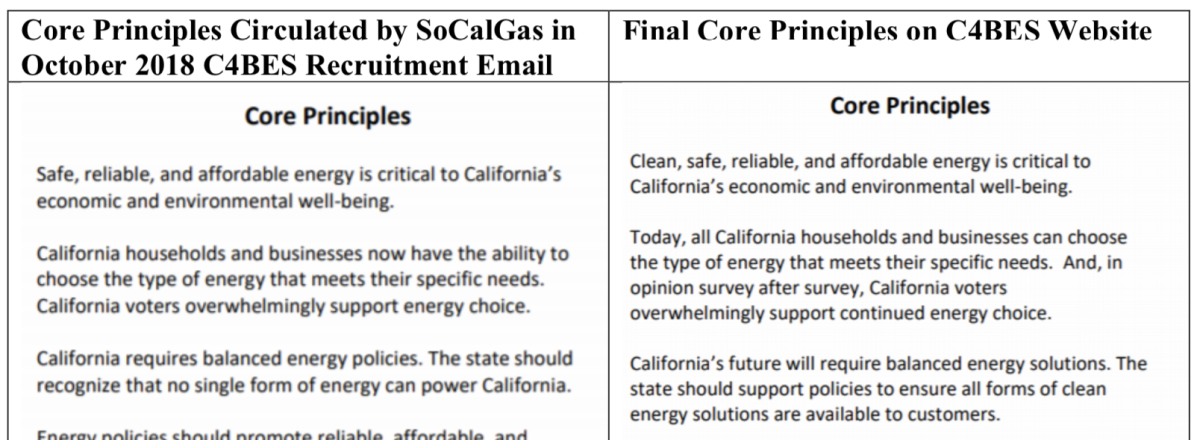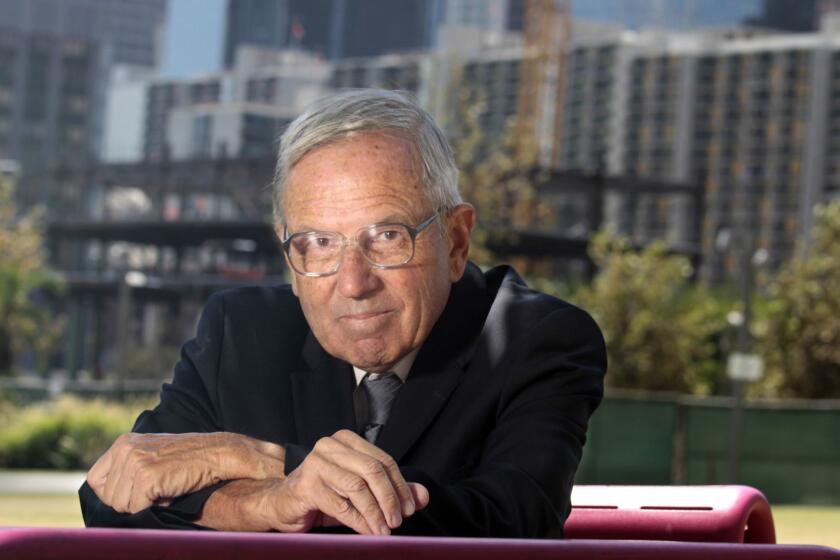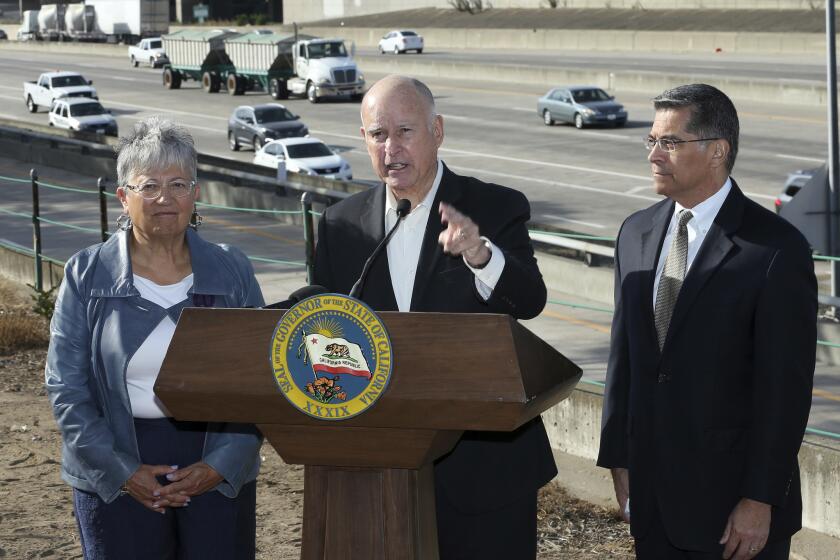Column: SoCal Gas accused of setting up an ‘astro-turf’ group to plead its case to regulators
Swathing itself in all the humility of a grass-roots organization representing the interests of natural gas users, big and small, Californians for Balanced Energy Solutions applied last March to be named an official party to a Public Utilities Commission proceeding on the future of gas usage in the state.
“Our goal,” the organization said, “is to educate Californians about the importance of natural and renewable gas for improving the environment and providing for a strong economy.”
For the record:
2:25 p.m. Aug. 8, 2019An earlier version of this article included an incorrect title for Ken Chawkins. He is a SoCal Gas employee, not a SoCal Gas executive.
It declared itself a supporter of fighting climate change “while protecting energy choice, reliability and affordability.” Obtaining designation as a party in the PUC rule-making process would give it an important platform for getting its message out.
The public is increasingly clear that not just coal and oil have to go away if we’re to meet our climate and air quality goals; the same thing is true of gas.
— Evan Gillespie, Sierra Club
Here’s what the organization, known in shorthand as C4BES, didn’t bother to mention in its application to the PUC, however: It’s not a grass-roots group, but a creation of Southern California Gas Co.
That’s what the Sierra Club alleges in its own filings with the PUC, and it has some documentation to back up that assertion. The PUC’s own Public Advocates Office, meanwhile, says it has unearthed evidence suggesting that the gas company used ratepayer funds to support C4BES, which it says violates rules requiring that utilities charge political advocacy and lobbying to their shareholders, not their customers. The company says allegations of its control over the organization are “pure conjecture.”
The Sierra Club is asking the PUC to reject the organization’s motion to become a named party, or failing that, to force the group to turn over internal documents to the Sierra Club to determine the gas company’s role.
It always was predictable that California’s utilities would ask for a heap of government assistance to cover their financial liabilities resulting from two years of epic wildfires.
The issue is important because the gas company’s business model is a target of the PUC proceeding in which C4BES is seeking party status. The proceeding aims to set policies for the “decarbonization of buildings,” which involves shifting energy usage from natural gas to electricity in homes, offices and factories. This change is vital to the state’s campaign to reduce greenhouse gases 40% below their 1990 level by 2030. Buildings and other fixed sources are the source of about one-fourth of greenhouse gas emissions in the state, so cutting them back would be a big deal.
That may be particularly true for SoCal Gas, which already is in the public doghouse thanks to its Aliso Canyon blowout and other mishaps with its pipeline infrastructure. “The public is increasingly clear that not just coal and oil have to go away if we’re to meet our climate and air quality goals, the same thing is true of gas,” says Evan Gillespie of the Sierra Club.
It’s not wrong for businesses with issues before government agencies to join with organizations that share common interests. “But there’s a big difference between persuading another party to support your position, versus funding a group, and having that group become a party,” says Michael Campbell, a program manager with the Public Advocates Office, which represents consumer interests before the commission. “It’s inappropriately amplifying their voice in a commission proceeding.”

Worse, when it started looking into whether SoCal Gas had used ratepayer funds for the effort, “we got a lot of false statements” from the company, Campbell told me. Lying to the PUC is a cardinal sin. The advocates office has asked the commission to sanction SoCal Gas for “false and misleading” responses to the office’s queries.
The strategy of hiding behind “astro-turf” groups — that is, groups whose “grass-roots” origins are entirely artificial — is not a new one. That’s especially true in California, where countless ballot propositions supposedly put up by civic-minded individuals or boasting of public benefits have turned out to have corporate pedigrees.
Last year, three big paint companies pushed a ballot measure amounting to a back-door effort to nullify a multimillion-dollar court judgment against them for selling lead paint. (They eventually dropped the effort.)
Column: With stocks in California utilities dirt-cheap, why shouldn’t the state just take them over?
For the bottom-feeders of the stock market, the shares of Pacific Gas & Electric Corp., the parent of California’s biggest utility company, must look very tempting.
In one of the most egregious cases, Pacific Gas & Electric Co. put up a voter initiative aimed at hamstringing the creation of municipal electric utilities, which would, obviously, compete with PG&E. The measure lost.
SoCal Gas refused to make any executives available to answer my questions about C4BES. Within an hour of my emailing an inquiry to the company, however, I was inundated with unsolicited phone calls from municipal leaders and other civic types volunteering their insights about the importance of energy “choice” for their constituents.
Tip for any entity accused of astro-turfing: If you’re trying to defend yourself from the accusation that you created an advocacy group to make your case, don’t send out frontmen and frontwomen to do so.
SoCal Gas portrays the issue as one of consumer choice. Ninety percent of households in Central and Southern California use natural gas for space and water heating or cooking, as well as “for backyard barbecues, fireplaces, clothes drying and pool heating,” according to company spokeswoman Christine Detz. The company says its customers “consistently report they prefer natural gas by a margin of 4 to 1 over electricity,” in part because it’s cheaper.
Nearly 2 million electricity customers in California may not know it, but they’re part of a revolution.
Yet the PUC isn’t proposing to outlaw these uses in existing homes. Its goal is to coordinate with the California Energy Commission to develop incentives to encourage construction of all-electric homes and buildings. Nor is this the PUC’s own initiative; it’s a response to Senate Bill 1477, which was signed last year by then-Gov. Jerry Brown and directs the agencies to move ahead.
The gas company also asserts that the building electrification campaign overlooks the potential of “renewable natural gas.” This is gas recovered from sources such as landfills and dairy manure, which it says can be had for one-third the cost of electrification. Yet renewable gas appears to be a red herring at this point in time.
A 2016 study by UC Davis estimated that California had the technical capability to produce about 91 billion cubic feet of renewable gas a year, but the commercial capability (based on gas prices) of only about 33 billion cubic feet. California consumes 2.1 trillion cubic feet of gas per year, however, meaning that renewable gas would account for at most 4.3% and as little as 1.6% of annual consumption, which undermines the company’s assertion that it’s a “viable alternative” to electrification.

SoCal Gas says it has been “transparent about our role in and financial support to Californians for Balanced Energy Solutions,” according to the statement from Detz. Jon Switalski, the executive director of C4BES, echoed the sentiment: “We’ve made no secret that we’ve been supported by the gas company,” he told me. He acknowledged that SoCal Gas had provided “seed funding” for the organization, but wouldn’t say how much. He says the company is currently “not a significant funder.”
The gas company’s public statements about its role in C4BES have — shall we say — evolved. In March, the company told Politico that it had been “invited” to join the C4BES board. A month later, my colleague Sammy Roth reported that the company had “played a leading role” in putting the group together.
The group’s four-page application to the PUC for party status doesn’t mention Southern California Gas even once. The truth is that the gas company’s fingerprints are all over the creation of C4BES. The Sierra Club’s filing mentions a set of “core principles” for the group written by a marketing firm working with SoCal Gas and circulated by the gas company in October 2018 to possible recruits to the C4BES board. It’s nearly identical to the “core principles” appearing on the group’s website.
To hear the Main Street Investors Coalition talk, you’d think that pension funds, index mutual funds and other big institutional investors are trampling their members’ interests with a tsunami of “political” — that is, leftist — demands on corporate managements.
A gas company executive, George Minter, sits on the C4BES board, and the company filed with the PUC a full-throated defense of the group against the Sierra Club’s challenge, denigrating it as merely “an attempt to silence an opposing viewpoint.”
The Public Advocates Office uncovered invoices to SoCal Gas from two consultants, Imprenta Communications and Marathon Communications — some dating back to 2018 — referencing work being done for C4BES. The invoices, some of which were handled by SoCal Gas employee Ken Chawkins, reference such assignments as providing “strategic communications consulting and implementation” regarding C4BES, “including outreach and media planning; message development [and] staffing for first board meeting.”
The documents were handed over to the advocates office with payment sums redacted, but Campbell says his office’s working assumption is that the spending was charged initially to ratepayers, and shifted to shareholder accounts only after the advocates started probing. SoCal Gas says the assertion is a “false conjecture.”
The chairman of the C4BES board, Matt Rahn, a faculty member at Cal State San Marcos and a member of the Temecula City Council, told me that the organization was his idea and an outgrowth of his work teaching environmental policy.
California’s climate deal with automakers shows the proper solution to Trump is to go around him.
Yet documents filed with the PUC by the Sierra Club appear to undermine that claim. Among them is an Oct. 3 email to Rahn from Chawkins opening: “I want to welcome you aboard and thank you for joining Californians for Balanced Energy Solutions.” One would think that if Rahn originated C4BES and SoCal Gas were merely “invited,” the email would have gone in the other direction and Rahn would be welcoming Chawkins aboard.
Rahn says the Sierra Club took the email “out of context” and that Chawkins’ email is merely a sample of what would be sent to other board recruits.
Rahn acknowledges that the gas company “helped to provide some of the initial funds” to launch C4BES, but that contributions from other interested parties, such as construction unions and realtors, now amount to more. He also downplays a $25,000 contribution SoCal Gas made to his Cal State institute about two weeks after the Chawkins email; the contribution represented long-term support of the company for the university, and its spending isn’t under his control, he says.
The callers sent my way by the gas company all made essentially the same point: that forcing homeowners and businesses to change to fully electrify their premises would be costly and unfair. They generally spoke up for “freedom of choice.” That sounds suspiciously like a Southern California Gas talking point, and suggests that the effect of greenhouse gases on climate should be up to individuals, rather than the community, to decide.
What the callers didn’t seem to understand is that whatever the virtues of their position, it’s hopelessly compromised if the gas company turns out to have created a front group to tilt the debate. SoCal Gas and C4BES need to come clean, but fast. If they don’t, the PUC should let the Sierra Club start prying.
More to Read
Inside the business of entertainment
The Wide Shot brings you news, analysis and insights on everything from streaming wars to production — and what it all means for the future.
You may occasionally receive promotional content from the Los Angeles Times.















